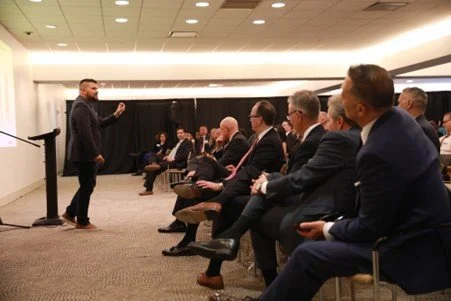Discussion trumps Presentation by Aubrey Rebello
Most Coaches & Business Consultants are keen to pass on their knowledge & experience through Power point Presentations (PPT) or slide decks.
These Presentations are often good, but do not entirely capture the issues plaguing the Team that need to be addressed.
Unfortunately, presentations cannot be the Swiss Army knife of communication.
Though they are one of the most powerful tools we have for moving an audience, even the most carefully crafted presentations will not be effective if they’re not delivered in the right context.
Sometimes, a conversation is much more appropriate and effective.
How do you know when that is the case?
Ask yourself what you want to get out of the time you have with the group.
Do you need to simultaneously inform, entertain, and persuade your audience to adopt a line of thinking or to act? Or
Do you need to gather more information, have a discussion, or drive the group toward consensus to get to your desired next step?
Generally, if your idea would be best served by more interaction with your audience; you should possibly have a conversation instead of delivering a presentation.
At the Senior Management Level, time is precious. A Presentation will take 60 minutes or more to impart "Knowledge & Wisdom” but often the key needs of the Team may not be addressed and is therefore time wasted.
Each senior management team is unique and needs a focused approach to Address, Rectify & Improve their performance to achieve their desired results. Everyone who sits in the team is well educated with good experience, aware of management concepts and work improvement tips.
In my interactions with Senior Management, my advice most often is simple
Team members are best equipped to handle and solve team issues.
They are often better equipped than any Coach if they are provided with the right tools.
A coach is only a Catalyst that can provoke a discussion, question assumptions, and offer possible alternatives. Bringing in an outsider to the team adds a new dynamic that can help surface the unspoken issues that need to be confronted and have the skills, capacity and capabilities to hold the space for what can often be uncomfortable and highly emotional and energetic conversations that finally result in action. They need to act independently when they are with the team and, at the same time, have an awareness of the underlying challenges for each of the team members, and perhaps during the team coaching, facilitate and mediate between certain dynamics to bring forth those conversations where communication can be had. The role of the coach isn’t to find the solution to their problem but rather to enable the conversations that need to be had at the right time during the meeting to uncover opportunities or other surprises that need to be managed. This is why the coach acts as a catalyst. ]
I have often seen that teams are normally surprised and happy with no presentations because it has shifted the focus from what the coach knows and wants to share, and competing for attention to them and their needs. They feel empowered as they are not just a passive audience.
Interactions are easier, issues are identified, plus, measures for improvement can be tabled instantly. Even the silent team members feel like contributing when everyone is involved in a discussion with a goal to resolve issues.
Preparing for a Group Discussion
In my many interactions when I coach, I have observed the following brings out the best results:
When everyone is a team member and no one is the boss
Everyone is given a listening ear
Generalisations are not helpful – specific solutions are
Flipcharts as a prop is a good way to drive a point home
Being respectful to all is key
As a Coach, my role is to moderate this activity, referee when moments are tense, mentor when in an impasse and reach a solution that is agreeable to all with action points for the future. If it’s not the coach, then the team member chairing and facilitating the meet needs to have these skill-sets.
When each member has participated, and feels empowered to be a part of the solution, they are better suited to take ownership to resolve issues.
It is therefore my view that a good old-fashioned discussion and interaction often trumps presentations!
To connect with Aubrey Rebello
Aubrey brings to the table over 40 years of rich & varied Corporate Experience as CEO, Director, and Business Head with Tatas & Bayer.
Aubrey has strategised & managed a major merger, was CEO of a large NBFC, & Profit Centre Head of a large Business. In all his assignments he has rapidly scaled up revenues & profits. In many areas he has also built up Structures & Processes from scratch.
Post retirement Aubrey continues as an Advisor to a Tata Company. Aubrey is also an Executive Coach to several Indian & Foreign Corporates He is also an expert in Family managed Businesses serving as a Business Consultant & Mentor to Business Families. Having had Leadership Roles in different work Areas & Industries Aubrey’s expertise is in Financial Services , Automobile Industry, Mergers & Integration , Materials Management , & Learning & Development .
Aubrey is an Engineer from IIT Bombay & a First Rank Gold Medallist MBA from IIM Ahmedabad. He is also a Certified Executive Coach - International Coach Federation & NEWS Switzerland. He has several hundred hours of coaching experience at the MD & CXO levels.












